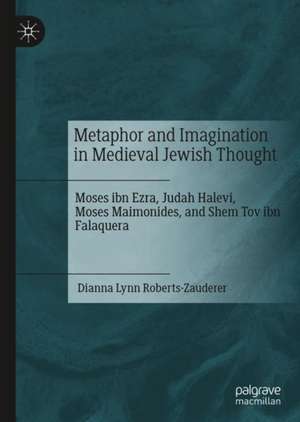Metaphor and Imagination in Medieval Jewish Thought: Moses ibn Ezra, Judah Halevi, Moses Maimonides, and Shem Tov ibn Falaquera
Autor Dianna Lynn Roberts-Zaudereren Limba Engleză Hardback – 19 dec 2019
This book reveals how Moses ibn Ezra, Judah Halevi, Moses Maimonides, and Shem Tov ibn Falaquera understood metaphor and imagination, and their role in the way human beings describe God. It demonstrates how these medieval Jewish thinkers engaged with Arabic-Aristotelian psychology, specifically with regard to imagination and its role in cognition. Dianna Lynn Roberts-Zauderer reconstructs the process by which metaphoric language is taken up by the imagination and the role of imagination in rational thought. If imagination is a necessary component of thinking, how is Maimonides’ idea of pure intellectual thought possible? An examination of select passages in the Guide, in both Judeo-Arabic and translation, shows how Maimonides’ attitude towards imagination develops, and how translations contribute to a bifurcation of reason and imagination that does not acknowledge the nuances of the original text. Finally, the author shows how Falaquera’s poetics forges a new direction for thinking about imagination.
| Toate formatele și edițiile | Preț | Express |
|---|---|---|
| Paperback (1) | 585.26 lei 6-8 săpt. | |
| Springer International Publishing – 27 dec 2020 | 585.26 lei 6-8 săpt. | |
| Hardback (1) | 586.67 lei 6-8 săpt. | |
| Springer International Publishing – 19 dec 2019 | 586.67 lei 6-8 săpt. |
Preț: 586.67 lei
Preț vechi: 690.20 lei
-15% Nou
Puncte Express: 880
Preț estimativ în valută:
112.27€ • 117.07$ • 93.31£
112.27€ • 117.07$ • 93.31£
Carte tipărită la comandă
Livrare economică 21 martie-04 aprilie
Preluare comenzi: 021 569.72.76
Specificații
ISBN-13: 9783030294212
ISBN-10: 3030294218
Pagini: 283
Ilustrații: XI, 268 p.
Dimensiuni: 148 x 210 mm
Greutate: 0.49 kg
Ediția:1st ed. 2019
Editura: Springer International Publishing
Colecția Palgrave Macmillan
Locul publicării:Cham, Switzerland
ISBN-10: 3030294218
Pagini: 283
Ilustrații: XI, 268 p.
Dimensiuni: 148 x 210 mm
Greutate: 0.49 kg
Ediția:1st ed. 2019
Editura: Springer International Publishing
Colecția Palgrave Macmillan
Locul publicării:Cham, Switzerland
Cuprins
1. Introduction.- 2. “Human Language”: Classifying Metaphor in Jewish Sources.- 3. “Taste and See”: Imagination and Intellect.- 4. Transmission.- 5. Shem Tov ibn Falaquera and the Iberian ‘Afterlife’ of Maimonides’ Guide.- 6. “No Share in Poetry:” The Ethics of Figurative Language.- 7. Afterword.
Notă biografică
Dianna Lynn Roberts-Zauderer holds a PhD in Religion and Jewish studies from the University of Toronto, Canada. She has previously worked as a radio documentary producer, journalist, and Shoah Foundation interviewer.
Textul de pe ultima copertă
This book reveals how Moses ibn Ezra, Judah Halevi, Moses Maimonides, and Shem Tov ibn Falaquera understood metaphor and imagination, and their role in the way human beings describe God. It demonstrates how these medieval Jewish thinkers engaged with Arabic-Aristotelian psychology, specifically with regard to imagination and its role in cognition. Dianna Lynn Roberts-Zauderer reconstructs the process by which metaphoric language is taken up by the imagination and the role of imagination in rational thought. If imagination is a necessary component of thinking, how is Maimonides’ idea of pure intellectual thought possible? An examination of select passages in the Guide, in both Judeo-Arabic and translation, shows how Maimonides’ attitude towards imagination develops, and how translations contribute to a bifurcation of reason and imagination that does not acknowledge the nuances of the original text. Finally, the author shows how Falaquera’s poetics forges a new direction for thinking about imagination.
Caracteristici
Explores metaphor and imagination in medieval Arabic Aristotelian and Jewish thought Discusses how metaphoric language creates conceptual figuration that require imagination to unravel meaning Examines medieval Jewish thought in relation to both Islamo-Arabic and Christian Scholastic traditions
